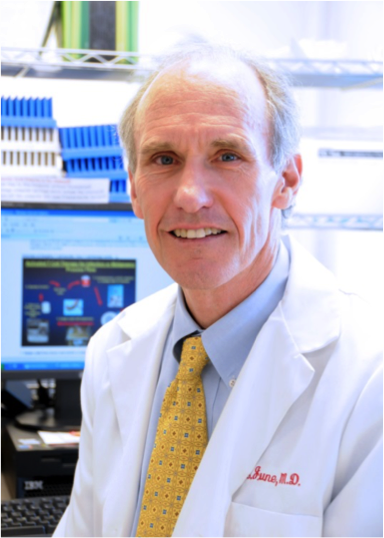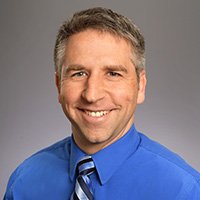Mary Jo Turk, Ph.D. is a Professor at the Geisel School of Medicine at Dartmouth in the Department of Microbiology and Immunology. MJ is the co-director of the Immunology and Cancer Immunotherapy Program at Dartmouth’s Norris Cotton Cancer Center. She has conducting pioneering research on the complex interactions between the immune system and cancer. Her work on the role of resident memory T cells in cancer are revolutionizing the field. We are honored to collaborate with them for more than two decades now.
Our last paper together was published in Science Immunology with Dr. Turk and team at the helm! Check out this link to read the paper:
https://immunology.sciencemag.org/content/2/10/eaam6346
.
David M. Neskey, M.D., MSCR, FACS is an assistant professor in the Department of Otolaryngology in the division of Head and Neck Surgical Oncology. Originally from Massachusetts, he received his medical degree from Albany Medical College with a distinction in research in 2006 followed by a residency in Otolaryngology Head and Neck Surgery at the University of Miami. He completed a fellowship in head and neck surgical oncology at MD Anderson in Houston. This training experience was comprised of two years dedicated to basic science research followed by a year committed to the management of patients with head and neck cancer. The Paulos lab collaborates with him on a Phase II clinical trial exploring the impact of T cells in tumor immunity. The Neskey and Paulos team were just awarded an MPI R21 to explore the role of CD26 T cells in tumor immunity.
Carl June, MD is the Richard W. Vague Professor in Immunotherapy in the Department of Pathology and Laboratory Medicine. He is currently Director of the Center for Cellular Immunotherapies at the Perelman School of Medicine, and Director of the Parker Institute for Cancer Immunotherapy at the University of Pennsylvania. He is a graduate of the Naval Academy in Annapolis, and Baylor College of Medicine in Houston, 1979. He had graduate training in Immunology and malaria with Dr. Paul-Henri Lambert at the World Health Organization, Geneva, Switzerland from 1978-79, and post-doctoral training in transplantation biology with E. Donnell Thomas and John Hansen at the Fred Hutchinson Cancer Research Center in Seattle from 1983 - 1986. He is board certified in Internal Medicine and Medical Oncology. He maintains a research laboratory that studies various mechanisms of lymphocyte activation that relate to immune tolerance and adoptive immunotherapy for cancer and chronic infection. In 2011, his research team published findings detailing a new therapy in which patients with refractory and relapsed chronic lymphocytic leukemia were treated with genetically engineered versions of their own T cells. The treatment has also now also been used with promising results to treat children with refractory acute lymphoblastic leukemia. He has published more than 350 manuscripts and is the recipient of numerous prizes and honors, including election to the Institute of Medicine in 2012 and the American Academy of Arts and Sciences in 2014, the William B Coley award, the Richard V Smalley Memorial Award from the Society for Immunotherapy of Cancer, the AACR-CRI Lloyd J. Old Award in Cancer Immunology, the Philadelphia Award in 2012, the Taubman Prize for Excellence in Translational Medical Science in 2014 (shared w S. Grupp, B. Levine, D. Porter), the Paul Ehrlich and Ludwig Darmstaedter Prize (shared w J. Allison), the Novartis Prize in Immunology (shared w Z. Eshaar and S. Rosenberg), the Karl Landsteiner Memorial award, the Debrecen Award and a lifetime achievement award from the Leukemia and Lymphoma Society.
Kinga Majchrzak-Kuligowska, DVM, Ph.D. is an Associate Professor at the University of Warsaw Life Sciences where she studies the role of Th17 cells and antitutmor T cells for canines. Her talented team is comprised of a lab of young and ambitious scientists passionate about veterinary immunoncology. Kinga is an excellent mentor to her trainees. She has many publications, research awards and federal grants.
Mark Rubinstein, Ph.D is an an associate professor in the Division of Medical Oncology at The Ohio State University and a researcher in the Pelotonia Institute for Immuno-Oncology at the OSUCCC – James, where he also serve as a member of the Translational Therapeutics Program.
My laboratory is focused on understanding how the immune system functions and on applying this knowledge to the development of immune-based therapies to treat cancer. His team seeks to bridge basic science and clinical medicine in order to develop novel strategies to treat cancer, including improving immune checkpoint therapy and adoptive cell therapy. They have ongoing collaborations with both industry and academic partners, and we are interested in new relationships that bring synergy and real-world solutions.
As part of our effort, we are studying lymphocyte biology and associated tumor immune inhibitory pathways. We are also studying how cytokines (such as IL-2 and IL-15) modulate immune responses, as well as developing novel protein-and antibody-based therapeutics.
His laboratory is also studying T-cell and antibody responses relevant to SARS-CoV2 vaccination or infection, including the impact of cancer therapies on the induction of long-lasting immunity. Finally, we are studying how pre-existing immunity with common coronaviruses impacts immunity to SARS-CoV2.
His work has been published in such peer-reviewed scientific journals as Science Translational Medicine, Lancet Oncology and Cancer Research. I am also the co-holder of a patent for cytokine receptor genes and the use thereof to enhance therapy.
Bei Liu, M.D. is a professor in the Division of Hematology, Department of Internal Medicine at The Ohio State University. The goal of Dr. Liu’s research is to develop novel targeted therapies for patients with multiple myeloma and other cancers. Her laboratory seeks to identify targetable pathways in B cells, T cells and dendritic cells to develop immunotherapies and unravel their underlying mechanisms of anti-tumor immunity in a variety of cancers. Dr. Liu’s research is supported by several competitive extramural fundings, including an NIH/NCI R01 grant, an NIAID U01 grant and a multi-institute NCI P01 grant. She has authored and co-authored numerous publications in peer-reviewed journals, including Immunity, PNAS, Journal of Clinical Investigation, Nature Communications, Cancer Research, Clinical Cancer Research and Science Immunology. Before joining Ohio State, Dr. Liu served as director of the Microbiology and Immunology Graduate Program at the Medical University of South Carolina. She has mentored trainees at multiple levels, including graduate students, postdoctoral fellows, physician-scientists and junior faculty. Dr. Liu holds professional memberships with the American Association of Immunologists, the American Association for Cancer Research, the Society for Mucosal Immunology and the International Society for Stem Cell Research.
Gregory B. Lesinski, PhD, MPH, is professor and serves as vice chair for basic research in the Department of Hematology and Medical Oncology at Emory University School of Medicine. Dr. Lesinski also serves as Winship Cancer Institute's associate director for basic research where he provides oversight and direction for the development and growth of Winship's basic scientific activities across the cancer center’s four research programs. Prior to joining Emory, Dr. Lesinski was associate professor in the Department of Internal Medicine, Division of Medical Oncology at The Ohio State University.
Dr. Lesinski holds professional memberships with American Association for Cancer Research, Society for Melanoma Research, Society for Immunotherapy of Cancer and American Association of Immunologists.






